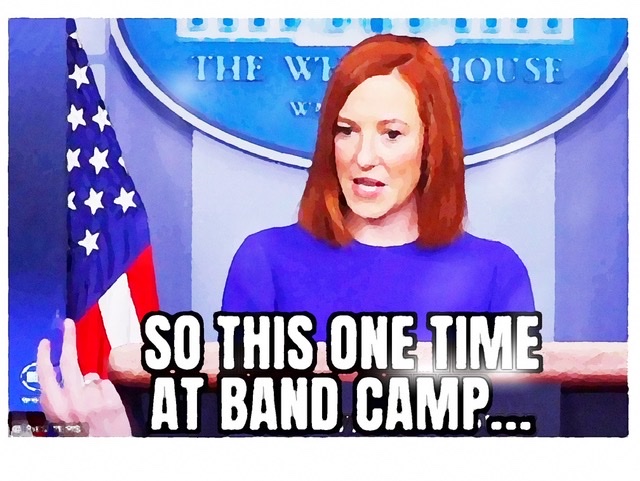Did you know Mr. Biden was the first US president in 100 years not to hold a solo press conference six weeks into office? Even during a recent Democrat-only Zoom meeting, his handlers quickly cut to the White House logo after he asked for questions. He rarely travels (even after being vaccinated) or speaks about much beyond un-doing Trump (Paris Accord) or doing better than Trump (vaccinations). Some leadership, huh?
Spokeswoman Jen Psaki is struggling with Biden’s dome of silence: “circle back” is her stock answer. Reporters press for a Biden press conference: “we’ll definitely have one, and you’ll be the first to know” (if ever). Reporters press about Biden’s January 14 State of the Union promise (“next month, in my first appearance before Congress”): “we don’t have a date for a joint session at this point” (if ever). Some return to normalcy, huh?
Candidate Biden crowed, “we are a democracy…you can’t [legislate] by executive order unless you’re a dictator,” but he’s already signed 34 executive orders, 13 presidential memoranda, 16 proclamations, and 3 presidential notices. No wonder his Republican disapproval rose from 70% to 80%, and Independent disapproval from 30% to 48%, in February (source: Monmouth). One cannot run against a divisive despot and then govern as a divisive despot, without buyer’s remorse from swing voters.
I wrote during The Insurrection that Biden was a bungler like Jimmy Carter because of two soon-to-be-realized failings. His first failing was talking a good pandemic plan without actually having a plan. Right now, we know the pandemic peaked three weeks before Biden took office and a million Americans were vaccinated on the day of his inauguration. Not a problem, except Biden and Psaki keep saying there was no plan or vaccine until they took over the presidency.
Blowhard presidents are tolerated, but bungling presidents are not. Right now, with 87 million Americans vaccinated and another 23 million recovered, the electorate is less fearful of getting sick and more fearful of shut-down businesses and schools. Already, open-up governors in red Texas and Mississippi compare favorably to shut-down governors in blue New York and California (who are under attack for bungling their shut-downs). The same fate awaits Biden.
Biden’s second failing is inviting a supply-side recession (or worse) by priming the pump and closing the spigot at the same time. Back in 1973, the OPEC oil embargo showed how providers can tip a robust economy. Now, I see firsthand how producers are using scarcity to delay orders and jack up prices. The New York Times just confirmed the global scarcity of ocean containers that has constrained my company since September 2020. On top of this, Biden wants to choke domestic energy production.
There is no slumping demand in need of stimulus when the Atlanta Federal Reserve predicts 2021 Q1 GDP growth of 10% (on top of 4.1% growth in 2020 Q4), and 379,000 new jobs (355,000 in hospitality) were added in February. States re-opening and 6.2% unemployment mean Biden’s $1.9 trillion stimulus, on top of Trump’s $3.4 trillion, will spike demand for goods and services Americans already cannot get. Right now, sellers everywhere are dropping customers, goods and services, and raising prices (at least 10%).
The US is barreling toward herd immunity, opened schools, and recovered travel and hospitality businesses – and Biden is about to bugger it up. He should veto this $1.9 trillion omnibus spending bill and ask Congress to invest in America’s infrastructure. Further, he should delay his war on domestic fossil fuels and tell small businesses, “Read my lips: no $15.00 minimum-wage law.” A prudent economic leader, to do no harm, would exercise caution.
Bungling the economy was always the risk with Joe Biden, whose intellect was so underwhelming and confidence so lacking, he lied about it. Let’s put Biden’s sugar rush in context. In 2000, after 100 years of stimulus bills, the national debt was $5.7 trillion – matched by Pelosi’s congress in just nine months with $5.3 trillion in stimulus (all debt). Perhaps the circle of life – millennials and boomers forming new households – trumps events (inflation and shortages) that induce recession, but don’t bet on it.
